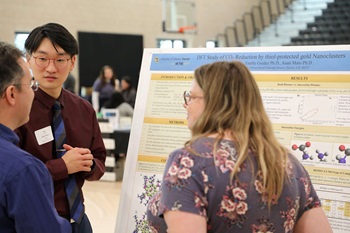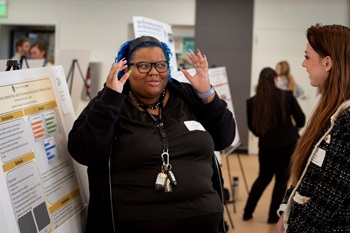Steps to Being an Undergraduate Researcher
Find out how to get involved with research and creative activities at CU Denver!
Feb 27, 2023
Step 1: Question: Investigation and creative inquiry always starts with a question- I wonder why or how or what? For example, who made up the Irish population in Leadville, CO in the late 1800s? Where do you learn to conduct research in the field of computational chemistry? What are the effects of anti-immigrant rhetoric on a person’s health? How do you build a keyboard using open-source instrument builders? Through the process of finding the answers to those questions, CU Denver students are researchers and creative scholars:
“During my participation in undergraduate research the last few years, I have become more confident in my ability to construct research questions, develop a hypothesis, and share these ideas with others.” Jessica Valdez — Criminal Justice Researcher
 Step 2: Grow: From that first question, the next step is to learn how to find the answers you’re looking for. At CU Denver, undergraduate researchers are learning to code software for genetic health research, conducting surveys on perceptions of the police, comparing bilingual education techniques, analyzing concepts of the male gaze through film, and more! They may be working in a lab with a team, learning from a mentor one-on-one, or expanding their questions beyond a paper they started in class. More than just learning about the topic, undergraduate researchers build many skills along the way:
Step 2: Grow: From that first question, the next step is to learn how to find the answers you’re looking for. At CU Denver, undergraduate researchers are learning to code software for genetic health research, conducting surveys on perceptions of the police, comparing bilingual education techniques, analyzing concepts of the male gaze through film, and more! They may be working in a lab with a team, learning from a mentor one-on-one, or expanding their questions beyond a paper they started in class. More than just learning about the topic, undergraduate researchers build many skills along the way:
“Because I was able to conduct my own research as an undergraduate, I have more confidence talking about my research - I was the one who planned, worked, and finished my research. I want to do this for the majority of my career- I love being an academic and I plan to continue in school through my PhD!” Daisy Wanless — Physics Researcher
“I think communication was one of the main things I improved upon this year. Although not perfect, I better understood not only how to communicate with my peers, but with researchers from other disciplines. I enjoy the work of doing research and have found a passion in educating myself and investigating topics in an in-depth manner.” Vrishank Bikumalla — Chemistry Researcher
Step 3: Share: Even the most interesting findings won’t go very far without being shared! Our undergraduate researchers and creative scholars present and communicate their projects every year at the annual Research and Creative Activities Symposium (RaCAS)! Here you can see first-hand what students just like you are working on. From science projects understanding diabetes and insulin secretion to art installations of petroglyphs depicting Colorado’s endangered species - RaCAS is a huge celebration of student-driven research and creative activities!
“I was so excited that so many undergraduate researchers were all in the same place, all with high energy and so much curiosity. It really fired me up that there were so many like-minded people in the same place simultaneously, all pursuing their passions. It's just an inspiring time.” Julianna Wright — Biology Researcher
Don’t take our word for it, come see for yourself on April 28, 2023!
Did you know? You can present any research or creative project you’ve been involved in! Do you work in a research lab? Are you writing a compelling paper in class? Want to give a performance, show a film you are working on, or showcase your art? Submit a RaCAS abstract today!
It's ok if your project is still in early stages, RaCAS is an opportunity to get feedback about your work along the way.
Additional examples:
- Senior and master's theses
- Capstone projects
- Dissertations
- Original art
- Performances
- Media presentations
- Independent study projects
- Internship activities
